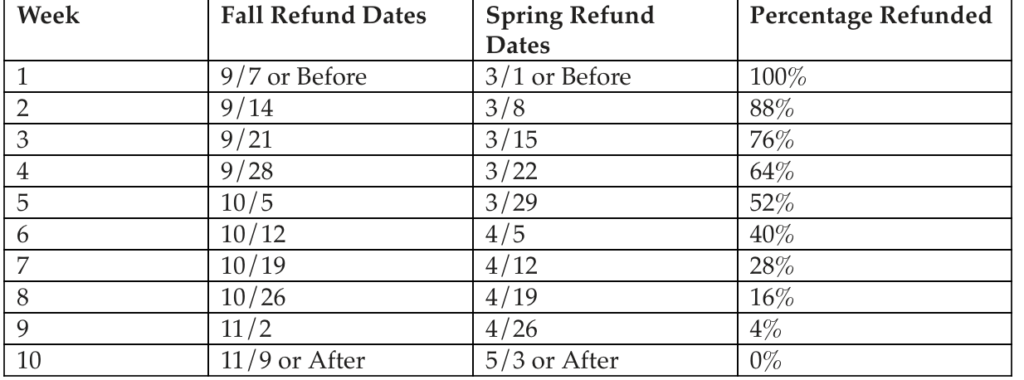Brendan W. Clark ’21
Editor-in-Chief
Trinity’s return-to-campus protocols and limitations on off-campus travel under its Community Contract, announced last week by Vice President for Student Success and Enrollment Management Joe DiChristina, will operate largely on an honor system. The Tripod has also learned that students, if they contract the coronavirus on Trinity’s campus and have to withdraw, will be eligible for refunds for tuition and other expenses only on a case-by-case basis and not by default.
DiChristina, speaking to the Tripod this week, admitted that the Contract’s limitations and restrictions on off-campus travel for “essential services” lacked a “legal basis” and instead asked “students to focus on the health and safety of our community.” DiChristina described the provision—which bars student travel except for “family emergencies, pharmacy, hospital/doctor, legal appointments, necessary groceries, etc.”—as a way “students can demonstrate care for others.”
Despite the Contract’s bar against off-campus travel, DiChristina also indicated that there will be no change to the registration of cars and that students will be “permitted to have cars on campus, just like any other semester.” DiChristina also indicated that the College does not “plan to regulate use.” This is in contrast to reopening plans at Williams College, which outline a more comprehensive prohibition on off-campus student travel for any purpose.
Greek Life housing will not be subject to the “one student, one room” policy and the College will not detail “how they should set up rooms-singles or doubles [sic].” However, DiChristina also added that Greek organizations have “shown a commitment and understanding of what is to be expected.” DiChristina did not reference safety as a factor in the “one student, one room” policy, in contrast to President of the College Joanne Berger-Sweeney earlier this month, instead suggesting that the “one student, one room” policy was in place to ensure that “each student had their own space at the end of each day” and had been aimed at providing workspace options for students taking online courses.
While Greek Life has been asked to work with Trinity on “details regarding social distancing, dining, and use of buildings,” it was not clear how the College would enforce the Community Contract or other provisions on Greek Life properties. DiChristina did indicate that the College “if required…will follow-up with students that live off campus” and added that “all students no matter where they live are subject to college policies.”
When pressed on how the College would regulate and enforce the bar on students associating in each other’s dorms, DiChristina told the Tripod that it is “important that students limit density in the halls” and stressed that “everyone on campus has a role to play in the safety and well-being of themselves and one another.” DiChristina added that staff will “follow-up” in the case of violations but did not specify what form enforcement actions would take.
The Tripod also sought clarity on the prosecution of misconduct under the Contract and if the College would prosecute any and all violations under existing disciplinary regulations in the Student Handbook. DiChristina indicated that “The college is certainly able to follow-up on any possible violations of the community contract and the college will as issues arise.”
The College will only offer “grab-n-go [sic]” options in Mather and limited seating, though DiChristina added that it is his hope that “most students will take their meals back to other locations, such as their residence hall.” To compensate for this, Vice President for Finance and Operations Dan Hitchell indicated in correspondence this week that Trinity has “reduced board rates by 5 percent.” It was not immediately clear what impact this would have financially for families as costs for fall meal plans have not been updated by the College as of Saturday evening.
Trinity will not refund tuition if the College shifts to remote operations, Hitchell indicated in an email to parents and students. Rather, only room, board, and general fee expenses remain eligible for refund on a “prorated basis as the semester progresses.” Hitchell added that any refund will be “issued net of any financial aid that is more than tuition.”
Hitchell noted that “if the college moves to remote learning prior to September 7 due to COVID-19 issues, students would be eligible for a 100 percent refund net of financial aid.” By an October 3 cancellation, the refund amount would be reduced to 52%.

Further, Hitchell indicated that withdrawal policies would remain unchanged and that “A student who withdraws due to individual reasons before a campus closure, even if during the same semester as the campus closure, is not eligible for the refunds outlined above.” Hitchell declined to affirm if students would be guaranteed a refund in the event, they contracted the coronavirus on campus, telling the Tripod that the College would “evaluate each individual situation and make an appropriate determination at that time. As scenarios will vary, we will need to take a personalized approach to how each circumstance may be different and may require varying solutions.”
Regarding disciplinary procedures, DiChristina indicated that students found in violation of the Community Contract may be subject to the “procedures outlined in the student handbook.”
When asked what influenced selections for the “home health kit,” DiChristina affirmed that while the College believes that the items, including Acetaminophen and Ibuprofen, will help students “focus on their health.” DiChristina did clarify that any student “identified with COVID 19 [sic] will be cared for via the health center.” Students, if they contract the coronavirus, will receive “care from HHC [Hartford Health Care] professionals.”
DiChristina declined to provide testing and coronavirus preparation costs relative to the College’s partnership with the Broad Institute at MIT and Harvard at this time, adding that the costs are “being finalized in the coming weeks.”








+ There are no comments
Add yours